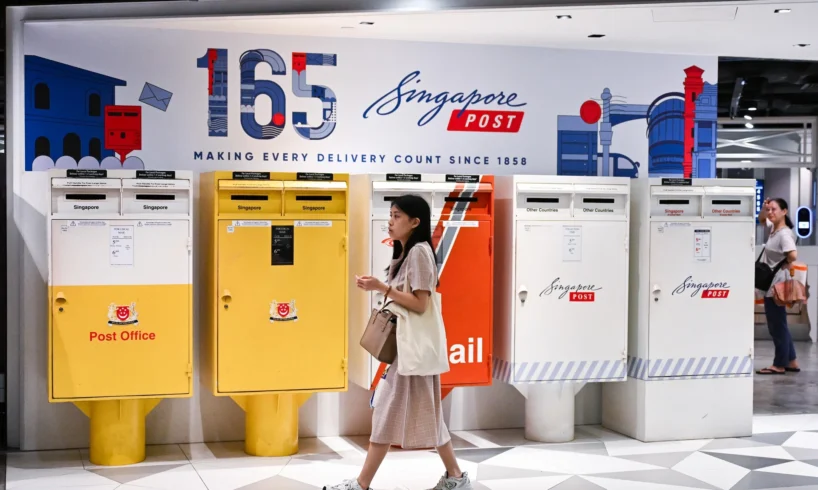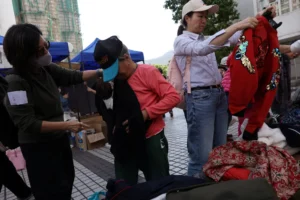
[SINGAPORE] Handmade glass jewellery maker Lee Chu Ling reckons the removal of tariff exemptions on low-value shipments to the US is like a lifeline cut, given that orders from the US make up 90 per cent of her monthly revenue.
With effect from Aug 29, all items with commercial value shipped to the US will be subject to duties and taxes ranging from 10 per cent to 50 per cent, depending on the product and the country of origin.
Previously, under the de minimis provision, low-cost shipments at or under US$800 (S$1,000) were allowed into the United States tariff-free.
However, US President Donald Trump in July announced the suspension of the provision, sending shockwaves across the world’s small business communities that depend on low trade barriers.
With the cessation of de minimis, Ms Lee, 52, said that she expects her business, LingGlass, to be severely affected.
Postage will become more expensive for small packages as they will be subject to the tariffs. This has led to postal services such as SingPost offering a new service that is slightly slower but more affordable to help senders cope with the costs.
BT in your inbox
Start and end each day with the latest news stories and analyses delivered straight to your inbox.
Countries such as Australia, New Zealand and Japan have suspended some postal services to the US in order to assess the new rules.
SingPost on Aug 19 announced that anyone sending parcels with commercial value to the US using its services can do so using the SpeedPost Express option after the suspension of standard post services from Aug 25.
Checks by The Straits Times showed that as at Aug 28, sending a parcel to the US using the tracked SpeedPost Express option would cost at least $159 for a package weighing up to 2kg.
Previously, it would typically cost Ms Lee $11.90 to send a parcel to the US using SingPost’s regular service. The new shipping fee will now be higher than the cost of her products, which are priced between $25 and $120.
With her jewellery business being her main source of income, Ms Lee said the “prohibitively high” shipping cost will impact her revenue, adding that she has a family of four to support.
She brings in between $2,000 and $4,000 a month from her US orders, with sales peaking during the year-end Christmas season, but has temporarily stopped shipping to the US.
Alternative courier companies, she told ST, are also charging rates around four to five times higher than the average shipping cost.
Ms Lee added that she has to find alternative streams of income quickly, such as selling e-books on how to make glass jewellery.
In response to queries from ST, a SingPost spokesperson said the company introduced a new service named Speedpost Direct International in August. It is a delivery duty-paid model where duties and taxes are calculated at the destination and charged back to the sender.
The spokesperson said it is a “more economical solution for businesses”, with cost savings of up to 80 per cent compared with its Speedpost Express service, although the delivery time is slightly longer at eight days.
If an item is unable to clear US Customs, it may either be returned to the sender in Singapore or disposed of at the destination at the discretion of the US authorities, the spokesperson added.
“This is precisely why SingPost made the proactive decision to suspend the standard service for commercial items from Aug 25 – to prevent our customers’ parcels from getting caught in this uncertain process and to provide them with a fully compliant solution from the start,” the spokesperson said.
Other small business owners who have been affected include Ms Eunice Chiong, 32, and Jon Calma Vergara, 52.
Ms Chiong sells artworks and art prints under the banner Eunice Denise. Her products typically cost between $10 and $55 and are handmade in Singapore.
About 50 per cent of all her orders come from the US, she said, adding that prior to SingPost’s announcement, her average shipping costs were between $7.50 and $11.90.
Like Ms Lee, Ms Chiong has decided to hold off on shipping to the US for now, given that shipping costs have become “much more expensive” and that she would not pay such high delivery fees herself.
Vergara, who owns JCV Custom Works and sells items like fishing lure stencils through his Facebook page, has also felt the pinch. Almost all of his orders come from the US, he said, adding that it is nearly impossible for him to expand his market elsewhere as customers outside the US prefer branded, pre-painted lures.
The practice of painting one’s own lure is not popular outside the US, said Vergara, who thinks it might be because of the mentality that branded is best. He added that only one tackle shop in Singapore carries his custom painted lures and that most people who buy them are either foreigners or tourists. According to him, customers in the US buy his fishing lure stencils to paint their own lures and sell them locally.
Unpainted lures are cheaper than branded lures that come pre-painted, he said. An original, painted lure can cost at least $23, while an unpainted lure, also known as a blank, can cost just a dollar.
Income from this business makes up about a quarter of his monthly income. On average, with four to five orders a week, Vergara brings in between US$1,500 and US$2,000 from this business. He is also a partner at DPC, an interior design firm that specialises in corporate offices.
His products, which range in price from US$14 to US$75, are delivered to the US using SingPost’s service.
In the meantime, Vergara said that using alternative courier services such as JustShip will cost him $28.10 to send a parcel to the US.
Previously, with SingPost’s regular service, Vergara paid $11.90 to send out parcels to America and charged a flat rate of US$15 for all orders worldwide, including the US. Now, he charges US$25 for shipments to the US, while maintaining the flat rate for other international orders.
Lower-cost options available, business as normal
While some postal services in Singapore have suspended delivery services to the US, others are offering help with the collection of duties and taxes.
JustShip, a shipping service company that started in 2020, has taken the opportunity to introduce a lower-cost shipping option.
Its chief executive officer and co-founder Sherman Lim said: “With de minimis suspended, all imports must be declared and will attract duties, taxes and fees. On our Express and Select services, we already classify the 10-digit US tariff code, confirm the country of origin, and file customs entries through licensed US Customs brokers.”
“We are extending the same compliance workflows to a new, lower-cost Standard Shipping option so brands that ship small or lower-price items at scale can stay viable,” Lim added.
Over the last year, Lim said JustShip upgraded its Singapore-to-US capabilities so the company was able to adapt quickly when the rules changed.
“Getting the paperwork right at the start reduces holds, rework and surprise costs. Combined with a curated network of delivery partners, that lets us offer a slower but more affordable service that still meets the new rules. If the recipient prefers to settle duties on arrival, we also offer select shipping (seven- to 10-day delivery) affordably, which offers a duties-unpaid option,” he said.
Lim said interest in his company’s services from small businesses has risen sharply since Aug 19, especially from sellers that rely on postal rates for lightweight items.
“Many Singapore brands sell lightweight items at low price points, which means that express postal services can be out of reach. Our goal is to give them a compliant path that is slower but still affordable,” he said.
For parcel delivery giant FedEx, business operations are not affected – it continues to accept and transport US-bound shipments from Singapore.
“As an express carrier, our international express offerings are not impacted by the decisions of postal operators. Our priority is supporting our customers and helping them navigate through the changes going into effect for US-bound shipments on Aug 29,” said FedEx in a statement to ST.
Logistics company DHL Express also continues to operate parcel delivery services from Singapore to the US.
A DHL spokesperson said the commercial import of goods into the US under the currently applicable customs rates “will still be possible”.
The spokesperson added that shippers can use the company’s digital tool, MyGTS, to get an estimation of the total cost of getting a product from the origin to destination. This includes all the duties and fees to be charged by US Customs, in addition to shipping fees and insurance.
Customers sending parcels and who want DHL to pay for the duties or fees on their behalf can select the optional service called “Duty Taxes Paid” when they prepare the airway bill. THE STRAITS TIMES





